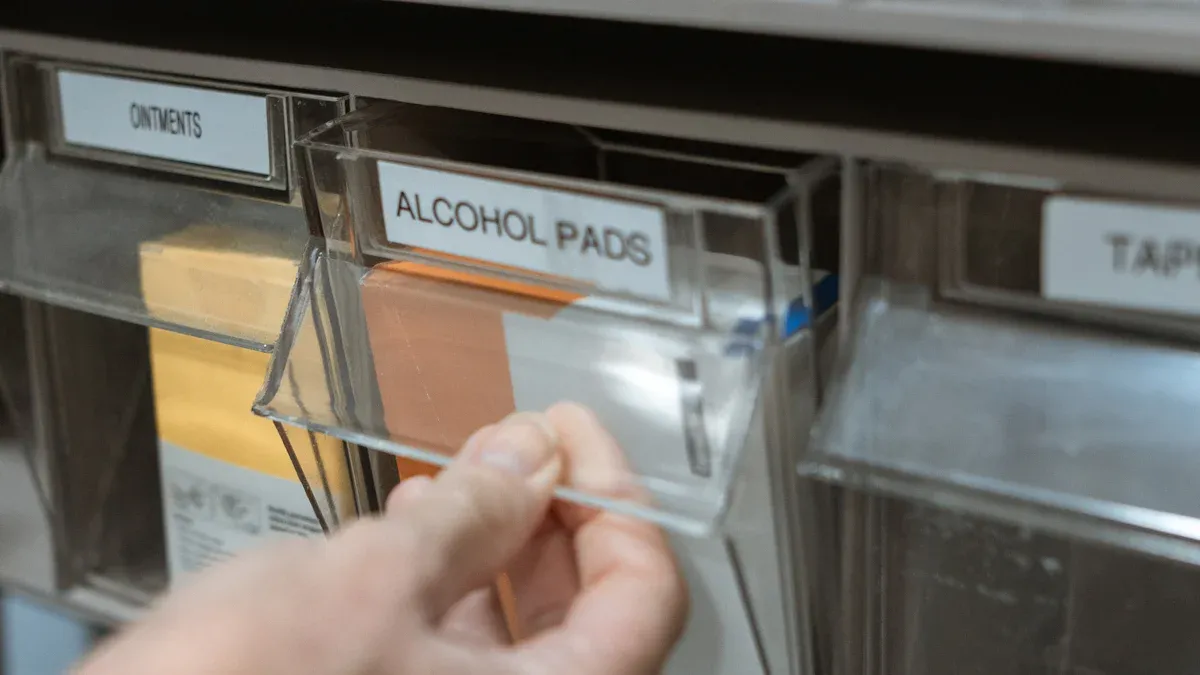Hospital-grade compact freezers serve as critical tools in healthcare environments. They ensure safe storage of vaccines, medications, and biological samples by maintaining precise temperatures. The CDC recommends stand-alone units, such as mini refriger fridg, for vaccine storage to prevent losses and safeguard integrity. Research shows that these refrigerated mini home units meet CDC temperature requirements, protecting sensitive materials from fluctuations. Unlike household units, small cooling refrigerators designed for medical use maintain stable conditions during defrost cycles, ensuring compliance with stringent regulations. Additionally, portable freezers can offer similar benefits in various settings, providing reliable temperature control for essential items.
What Makes a Freezer “Hospital-Grade”?

Hospital-grade freezers are designed to meet the rigorous demands of medical storage. They ensure the safety and efficacy of sensitive materials like vaccines, medications, and biological samples. These freezers stand apart from standard units due to their compliance with strict medical standards and their specialized engineering features.
Compliance with Medical Standards
Hospital-grade freezers must adhere to stringent regulatory guidelines to guarantee the safe storage of temperature-sensitive medical materials. Certifications like NSF/ANSI 456, developed by the CDC and NSF International, play a pivotal role in this compliance. This standard establishes precise temperature requirements for cold chain management, reducing vaccine wastage and ensuring the integrity of stored materials. For example, Helmer Scientific’s medical-grade freezers are certified to NSF/ANSI 456, ensuring they meet the performance standards necessary for healthcare applications.
To maintain compliance, healthcare facilities must implement several key practices:
- Temperature Monitoring: Continuous tracking and recording of temperature levels in storage areas are essential.
- Documentation: Detailed records of temperature data, maintenance schedules, and calibration reports must be maintained.
- Training: Staff handling temperature-sensitive items require proper training on best practices and regulatory requirements.
These measures ensure that hospital-grade freezers, such as the mini refriger fridg, meet the highest standards for medical storage.
Specialized Design Features of Mini Refriger Fridg
The mini refriger fridg exemplifies the advanced engineering that defines hospital-grade compact freezers. Its design incorporates features that enhance operational efficiency and reliability, making it ideal for healthcare settings.
| Feature | Description |
|---|---|
| Dual Refrigeration System | Independent systems maintain temperatures as low as -80ºC for added safety. |
| Microprocessor Control | Allows precise temperature control with a range of -40°C to -86°C. |
| Alarm Systems | Includes high/low temperature alarms and sensor error alerts. |
| Energy-Efficient Design | Utilizes hydrocarbon refrigerants and efficient cooling fans. |
In addition to these features, the mini refriger fridg offers a complete alarm system with optional remote monitoring. It is UL and CE certified, ensuring safety and reliability. The freezer also includes multiple built-in protection features, such as user-settable codes and voltage compensation, which safeguard its operation under varying conditions.
The specialized design of the mini refriger fridg ensures precise temperature control and dependable performance. Its compact size and dual-use functionality (cooling and heating) make it versatile for storing vaccines, medications, and even cosmetics. Every aspect of its design prioritizes the preservation of sensitive materials, making it a trusted choice for healthcare providers.
Benefits of Hospital-Grade Compact Freezers

Ensuring Medical Storage Compliance
Hospital-grade compact freezers play a vital role in maintaining compliance with medical storage regulations. These units are specifically engineered to meet the stringent requirements set by organizations like the CDC and WHO. By providing precise temperature control, they ensure that sensitive materials such as vaccines and medications remain effective throughout their storage period.
Tip: Proper temperature management is critical for preserving the potency of vaccines and other biological materials.
Healthcare facilities rely on these freezers to prevent temperature fluctuations that could compromise the integrity of stored items. Features like microprocessor-controlled thermostats and continuous temperature monitoring systems help maintain consistent conditions. Additionally, many models, including the mini refriger fridg, come equipped with alarms that alert staff to any deviations from the set temperature range. This ensures immediate corrective action, reducing the risk of material loss.
Enhanced Safety and Reliability
Safety and reliability are paramount in medical storage. Hospital-grade compact freezers are designed with advanced safety features to protect both the stored materials and the users. For instance, many units include lockable doors to prevent unauthorized access, safeguarding sensitive items like medications and vaccines.
These freezers also incorporate robust insulation materials, such as high-density EPS, to maintain internal temperatures even during power outages. Some models, like the mini refriger fridg, offer dual-use functionality, allowing them to switch between cooling and heating modes. This versatility makes them suitable for a wide range of applications, from storing vaccines to preserving cosmetics.
Note: Reliable performance is essential in healthcare settings where even minor temperature deviations can have serious consequences.
The durability of hospital-grade compact freezers further enhances their reliability. Built with high-quality materials, these units are designed to withstand the demands of busy healthcare environments. Their compact size also makes them ideal for facilities with limited space, ensuring that critical storage needs are met without compromising on performance.
Choosing the Right Hospital-Grade Compact Freezer
Factors to Consider
Selecting the right hospital-grade compact freezer requires careful evaluation of performance, reliability, compliance, and sustainability. Healthcare facilities must prioritize units that meet clinical benchmarks while aligning with operational needs.
| Criteria | Description |
|---|---|
| Performance | Optimal temperature management with excellent uniformity and stability, ensuring proper storage. |
| Reliability | Designed for long-term use with Accelerated Life Testing to ensure durability and minimize downtime. |
| Regulatory Compliance | Supports AABB Standards by maintaining temperatures below -18°C and continuous monitoring. |
| Sustainability | Utilizes natural refrigerants and is ENERGY STAR® certified, promoting energy efficiency and lower costs. |
In addition to these benchmarks, factors like size, capacity, and cost influence decision-making. Larger freezers accommodate future growth, while Energy Star-rated models reduce operational expenses.
| Factor | Description |
|---|---|
| Size and Capacity | Consider available space and future storage needs; larger freezers accommodate growth over time. |
| Cost | Identify necessary features to budget appropriately; costs vary significantly based on type. |
| Energy Efficiency | Choose Energy Star Rated freezers to conserve energy and reduce operational costs. |
Healthcare providers should assess these criteria to ensure the selected freezer meets both regulatory and practical requirements. Compact models like the mini refriger fridg offer versatility and reliability, making them ideal for facilities with limited space.
Top Brands and Models
Several trusted brands manufacture hospital-grade compact freezers that meet stringent medical standards. Helmer Scientific, known for its NSF/ANSI 456-certified units, offers reliable options for vaccine storage. PHCbi specializes in ultra-low temperature freezers, ensuring precise control for sensitive biological materials.
The mini refriger fridg stands out for its dual-use functionality, allowing both cooling and heating modes. Its compact design and high-density EPS insulation make it suitable for storing vaccines, medications, and cosmetics. Other notable brands include Thermo Fisher Scientific and Liebherr, which provide energy-efficient models with advanced monitoring systems.
Healthcare facilities should compare features, certifications, and costs to select the best freezer for their needs. Prioritizing compliance and reliability ensures the safe storage of critical medical materials.
Hospital-grade compact freezers play a vital role in healthcare by ensuring compliance with medical storage standards. Their importance is underscored by the growing global demand for biomedical refrigeration, valued at $2.88 billion in 2019 and projected to grow at a 4.72% CAGR.
- These freezers preserve biological samples like blood and vaccines at precise temperatures.
- Facilities should prioritize compliance, reliability, and capacity when selecting a unit.
Key Insight: Investing in the right freezer safeguards sensitive materials and supports better patient outcomes.
FAQ
What is the difference between hospital-grade and standard compact freezers?
Hospital-grade freezers meet strict medical standards. They offer precise temperature control, advanced safety features, and certifications ensuring compliance with healthcare regulations.
Can hospital-grade compact freezers store non-medical items?
Yes, they can store non-medical items like cosmetics or food. However, their primary design ensures the safe storage of sensitive medical materials.
How do I maintain a hospital-grade compact freezer?
- Regularly clean the interior with a soft cloth.
- Monitor temperature settings daily.
- Schedule professional maintenance to ensure optimal performance and compliance.
Tip: Always refer to the manufacturer’s manual for specific maintenance guidelines.
Post time: May-02-2025

